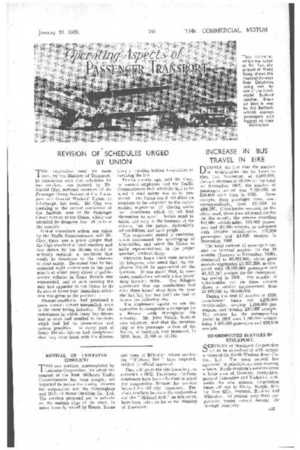REVISION OF SCHEDULES URGED BY UNION •
Page 109

If you've noticed an error in this article please click here to report it so we can fix it.
THE imperative need for more care, by the Ministry of Transport, in connection with time schedules for bus services, was stressed by Mr. Harold Clay, national secretary of the Passenger Group Section of the Transport and General Workers' Union, at Edinburgh, last week. Mr. Clay was speaking at the annual conference of the Scottish area of the Passenger Group Section of the Union. which was attended by delegates from all parts of the country.
Unless immediate action was taken by the Traffic Commissioners, said Mr. Clay, there was a grave danger that the high standard of road courtesy and care shown by bus drivers would be seriously reduced, a, condition that would be disastrous to the interests of road safety. He stated that he had attended eight conferences in the past month at which every driver of publicservice vehicles in Great Britain was represented, and at each meeting the men had appealed to the Union to do its utmost to see that immediate atten tion was given to the problem.
Present conditions had produced a nerve tension almost unequalled, even in the most trying industry. The circumstances in which many bus drivers had to work had resulted in incidents which had led to prosecution and serious penalties. In every part of Great Britain drivers had complained that they were faced with the alterna tives of running behind time-tables or breaking the law.
Twelve months ago, said Mr. Clay, he warned employers and the Traffic Commissioners that schedules had to be eased if road safety was to be preserved. The Union could not allow its members to be subjected to the nerveracking experience of driving under road conditions which do not lend themselves to speed. Action must be taken, not only in the interests of the drivers, but the public, particularly schoolchildren and aged people.
The conference passed a resolution which condemned the speeding-up of.
time-tables, and asked the Union to make representations, in the proper quarters, without delay.
• Excessive hours cases were revealed by delegates, who asked that the em ployers should be approached on the question. It was stated that, in some cases, conductors had only a few hours' sleep between shifts. One delegate mentioned that one conductress had only three hours' sleep from the time she had left her bus until she had to return the following day.
The conference 'agreed to ask the executive to inaugurate a campaign for a 40-hour week throughout the industry. Mr. John Veitch, Scottish area secretary, said that the member ship of the passenger section of the Union, in Scotland, had increased, in 1938, from 15,000 to 17,741. •




















































































































































